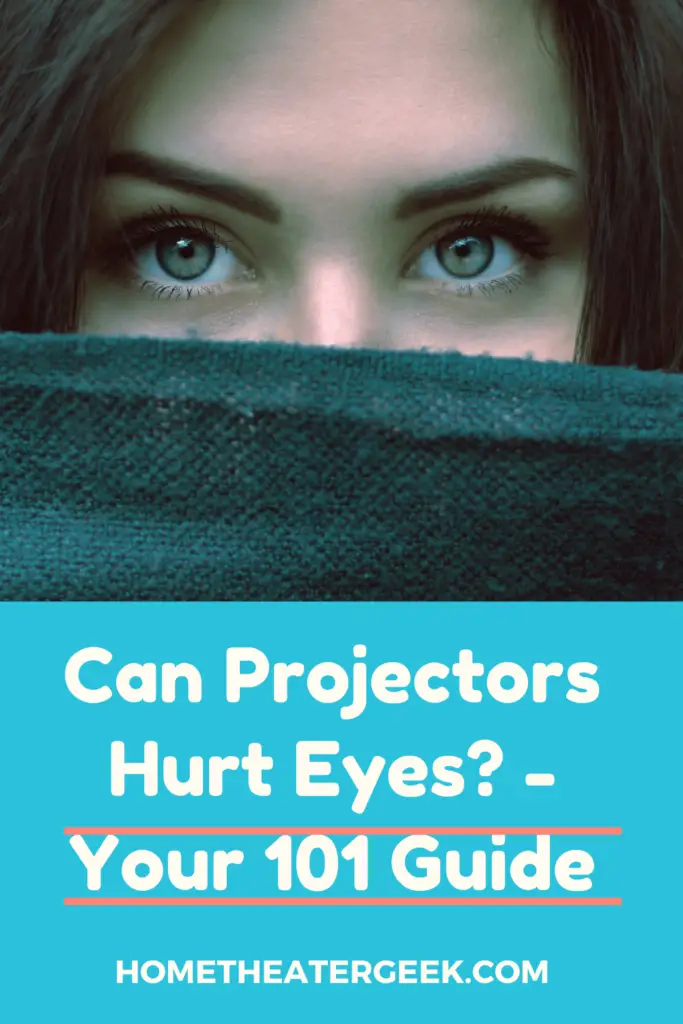We hope you love the products we recommend! Just so you know, we may collect a share of sales or other compensation from the links on this page. Thank you if you use our links, we really appreciate it!
Can Projectors Hurt Eyes? There’s a lot of projection equipment out there – from conference room projectors to home theater setups. They’re great for displaying data or videos, but can they harm our eyes? Some experts say that prolonged use of projectors can lead to eye fatigue and other vision problems. Let’s take a closer look at the risks associated with using projectors and find out what we can do to protect our eyes.

Table of Contents
Can projectors hurt eyes?
As anyone who has ever been caught in the beam of a high-powered flashlight knows, direct exposure to bright light can be painful for the eyes. So, it’s not surprising that some people are concerned that projectors, which emit a concentrated beam of light, might be bad for the eyesight.
However, there is no evidence that projector use can cause permanent damage to the eyes. In fact, most of the discomfort associated with projector use is due to the fact that people tend to stare at the screen for long periods of time without taking breaks.
How can projectors hurt your eyesight if used incorrectly for too long periods?
If you are looking at a projector for an extended period of time, it is possible to experience eye strain. This is especially true if the image on the screen is not properly calibrated. If the image is too bright, it can cause your eyes to fatigue more quickly. It is important to take breaks often when using a projector and to make sure that the image is not too bright.
Projectors can also cause headaches if they are not used correctly. If the projector is not properly calibrated, the image can appear to be flickering. This can cause headaches and dizziness in some people. It is important to make sure that the projector is properly calibrated before using it for extended periods of time.
If you experience any discomfort, it is best to stop using the projector and take a break. Projectors can also cause neck pain if they are not used correctly. If the projector is not properly positioned, it can cause your neck to strain.
Some tips to reduce the risk of eye strain when using a projector
Here are some tips to help you reduce the risk of eye strain when using projector:
- Use a proper screen or wall surface. A white or light-colored surface will help to reflect the light from the projector and reduce the amount of strain on your eyes.
- Adjust the position of the projector so that the image is not projected directly into your eyes. You should be able to look at the image without strain.
- Take breaks often, especially if you feel your eyes getting tired. Looking at a bright image for too long can cause eye strain.
- Use the lowest possible setting for the projector’s brightness and contrast. A higher setting may be necessary in a well-lit room, but it will also be more tiring on your eyes.
- If you wear glasses, make sure they are properly adjusted. Having the wrong prescription can cause eye strain.
Following these tips should help to reduce the risk of eye strain when using a projector. If you find that you are still having problems, it may be best to consult with an eye doctor.
Are there any long-term risks associated with using projectors regularly?
Extended use of projectors can cause eye strain and fatigue. It is important to take breaks often and to focus on other objects in the room every so often. Additionally, if a projector is not properly ventilated, it can overheat and become a fire hazard.
When choosing a projector, it is important to consider the level of brightness you need. A brighter projector will require more power and generate more heat. If you are using a projector for long periods of time, it is important to choose one that is not too bright and has good ventilation.
Additionally, it is important to be aware of the potential for electromagnetic interference (EMI) when using a projector. EMI can cause disruptions in electronic equipment and is more likely to occur with high-powered projectors. To avoid this, make sure that your projector is properly shielded and keep it away from any electronic equipment that might be susceptible to interference.
Can you wear glasses or contacts while using a projector?
Yes, you can wear glasses or contacts while using a projector. However, we recommend that you consult with your eye doctor to determine if this is the best option for you. Additionally, it is important to clean your glasses or contacts regularly to prevent any build-up of dust or debris on the lens.
If you have a DLP projector, then it is generally not recommended to wear glasses or contacts because it can cause eye strain. However, if you have an LCD projector, then it should be fine to wear glasses or contacts.
Will children’s eyes be more susceptible to damage from projectors than adults’ eyes?
There is no definitive answer to this question as it depends on a number of factors, including the individual child’s eyesight, the type of projector being used, and the circumstances under which the projector is being used.
However, it is generally agreed that children’s eyes are more susceptible to damage from bright lights than adults’ eyes, so it is possible that projector use could cause more harm to children’s vision than to adults. If you are concerned about the potential effects of projector use on your child’s eyesight, you should consult with an ophthalmologist or other medical professional.
Best types of projectors that won’t hurt eyes
Are you looking for a projector that won’t hurt your eyes? If so, here are some of the best types of projectors that you can use:
LED Projectors:
These types of projectors use light-emitting diodes (LEDs) as their light source. LED projectors tend to be much more energy-efficient than traditional projectors, and they also generate less heat. This makes them safer for your eyes, as there is less risk of the projector overheating and causing damage to your eyesight.
DLP Projectors:
DLP projectors use digital light processing technology to create an image. These types of projectors tend to be very bright, which can be great for presentations or watching movies. However, it is important to note that the brightness of a DLP projector can also be harmful to your eyes if you are not using the projector in a well-lit room.
Some recommended projectors are:
How to overcome the effects of eye damage after using projectors?
If you experience any eye damage after using a projector, it is important to seek medical attention immediately. Depending on the severity of the damage, you may need to consult with an ophthalmologist or other medical specialist. There are a few things that you can do at home to help ease the symptoms and promote healing.
First, try to avoid any further exposure to bright light, including sunlight. This will help to prevent further damage to the eyes. You should also rest your eyes as much as possible and apply a cool compress to them several times a day. If you are experiencing pain, you can take over-the-counter pain medication such as ibuprofen. It is also important to drink plenty of fluids and eat healthy foods to help support the healing process.
Conclusion
So, what’s the verdict? Can projectors hurt eyes? The answer is a definitive yes. Projectors can cause eye fatigue and even long-term damage if they aren’t used correctly. Thankfully, there are ways to prevent this from happening. Make sure you take breaks often, use the correct brightness settings for your environment, and keep your projector clean. By following these simple tips, you can help protect your vision and ensure that watching projectors doesn’t result in any lasting harm.




